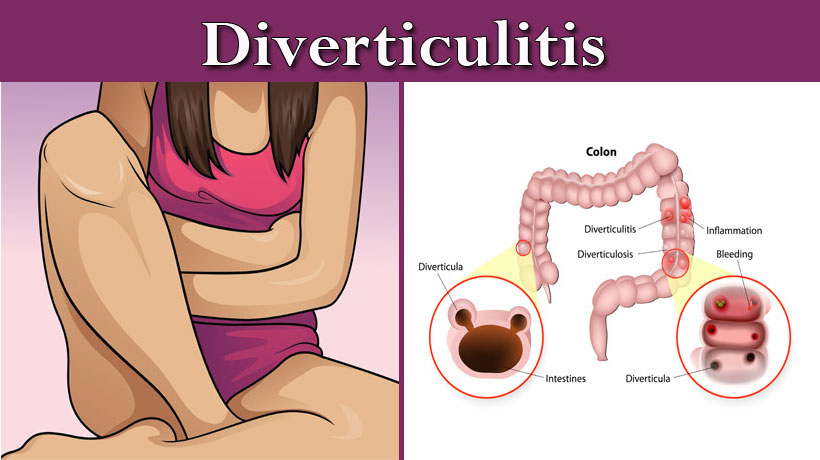Fiber is usually your friend. There are two types of this friend: soluble fiber, which can help lower bad cholesterol levels, and insoluble fiber, which promotes movement in the digestive system.
For most Americans, however, fiber is that one friend with whom you keep meaning to make a lunch date but never get around to it. Experts recommend 20 to 30 grams of fiber every day, yet a study published in the American Journal of Medicine found Americans only had an average of 15 grams of fiber per day.
Years of a diet low in fiber may have consequences. According to the U.S. National Library of Medicine, about half of all people older than 60 suffer from diverticulosis. They say that doctors believe this is usually caused by a low-fiber diet.
Inflamed diverticula
Diverticula are small, bulging pouches that can form through the large intestine (colon). Diverticula are common, especially after age 40, and having this condition is a condition called diverticulosis. Sometimes it causes mild cramps, bloating or constipation; otherwise, they usually aren’t noticeable.
If one or more of those pouches become inflamed or infected, the condition is called diverticulitis. Common symptoms include fever, nausea, vomiting, chills, cramping, and constipation. The health resource website Mayo Clinic says a common sign is pain, which may be constant and persist for several days. The lower left side of the abdomen is the usual site of the pain, but the Mayo Clinic says sometimes the right side of the abdomen is more painful, especially in people of Asian descent.
Serious cases of diverticulitis can lead to bleeding, tears, or blockages. The National Institute of Diabetes and Digestive and Kidney Diseases (NIDDK) says there’s a large amount of red or maroon-colored blood in the stool. Diverticular bleeding may also cause dizziness or weakness.
Fiber’s role
The U.S. National Library of Medicine says most doctors believe a diet low in fiber causes diverticulosis. However, the NIDDK says that while doctors believed this for over 50 years, a 2012 study published in the journal Gastroenterology says a diet high in fiber may be linked with a higher chance of diverticulosis because there may be more frequent bowel movements. Most other sources (see below) suggest a low-fiber diet may be the culprit.
Whether it’s too much or too little, eating the recommended amount of fiber may minimize the chance of developing diverticulosis or letting it worsen into diverticulitis. Talk to your doctor about the right amount of fiber that may work best for you.
Other causes and risk factors
While there isn’t a consensus on exactly how diet plays a role in diverticulosis and diverticulitis, science has found a correlation with several other risk factors.
Age seems to be a prominent factor. According to the NIDDK, 35 percent of American adults age 50 years or younger and about 58 percent of those older than 60 have diverticulosis. Obesity, smoking, and a lack of exercise also increase the odds. The NIDDK says certain medications, such as nonsteroidal anti-inflammatory drugs (like ibuprofen), can affect diverticula.
Treatment
The NIDDK says that although a high-fiber may not necessarily prevent diverticulosis, it could prevent symptoms or complications from developing. They say your doctor may suggest that you introduce more fiber into your diet slowly to reduce your chances of having gas and abdominal pain.
The American Society of Colon and Rectal Surgeons says most cases of diverticulitis can be treated with antibiotics. In rare cases, a doctor may recommend surgery to remove the affected part of the colon if the diverticula don’t respond to other treatment and are causing more problems.
Sources:
https://www.hsph.harvard.edu/nutritionsource/carbohydrates/fiber/
https://www.ncbi.nlm.nih.gov/pubmed/24135514
https://medlineplus.gov/diverticulosisanddiverticulitis.html
https://www.mayoclinic.org/diseases-conditions/diverticulitis/symptoms-causes/syc-20371758?p=1
https://www.niddk.nih.gov/health-information/digestive-diseases/diverticulosis-diverticulitis/symptoms-causes
https://www.health.harvard.edu/diseases-and-conditions/defend-yourself-from-diverticulitis
https://health.clevelandclinic.org/should-patients-with-diverticulitis-avoid-or-up-their-fiber/
https://www.fascrs.org/patients/disease-condition/diverticular-disease
This article is for informative purposes only. Please reach out to a medical professional if you have any symptoms.



